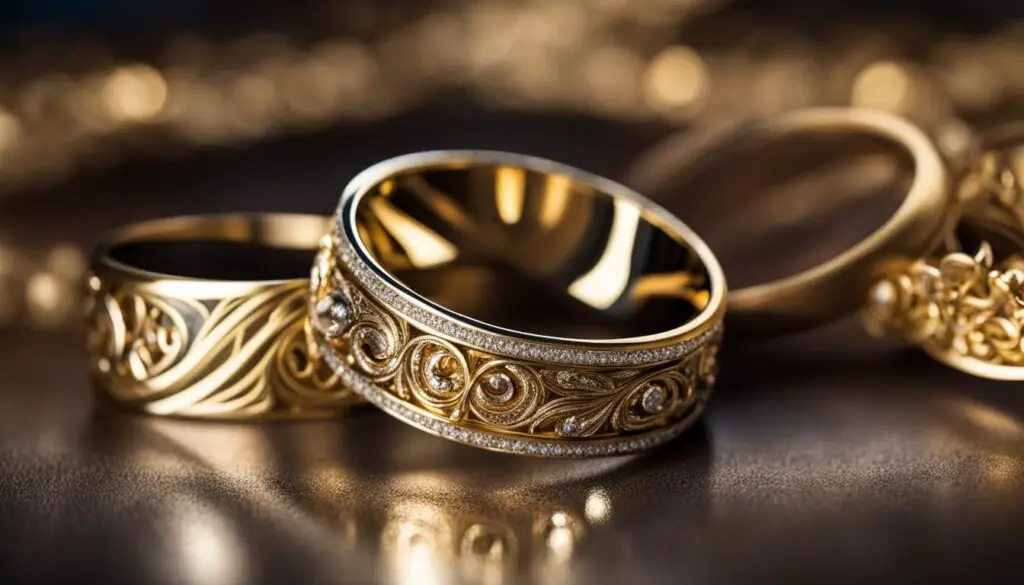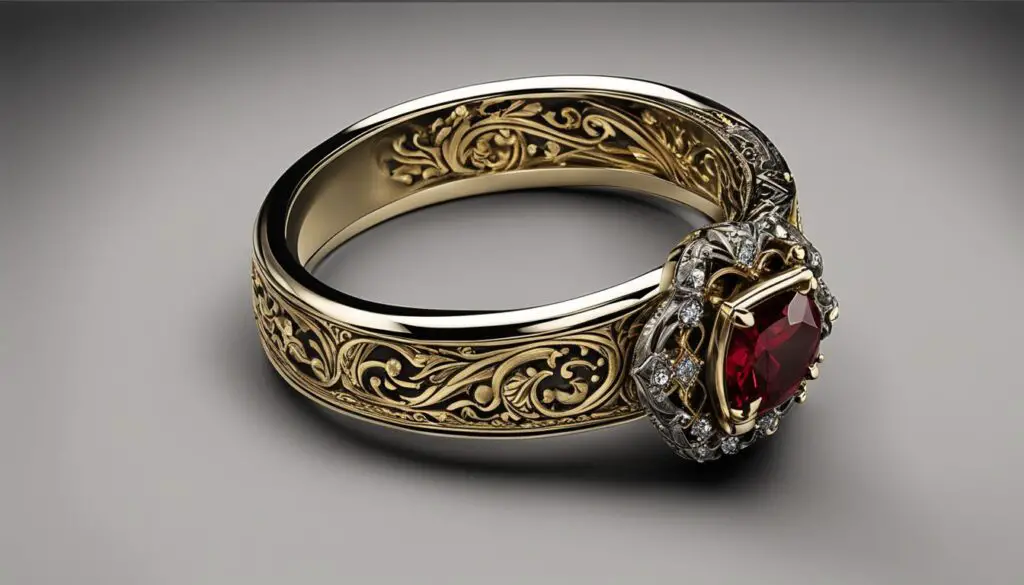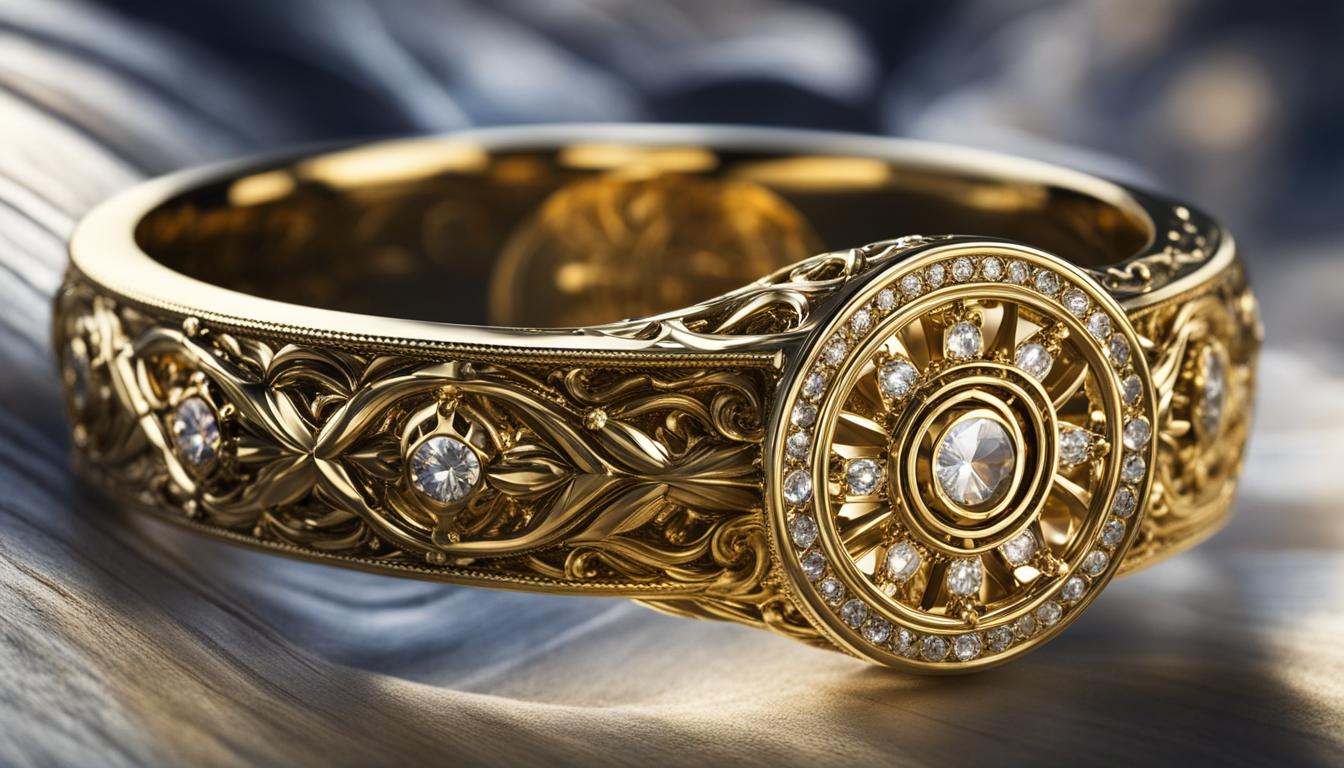When exploring the deep symbolism found in the Bible, one cannot overlook the significance of rings. Mentioned in various contexts, rings hold ancient meanings that can enhance our understanding of biblical scriptures. From personal adornment to symbols of authority and honor, rings play a vital role in the cultural and spiritual tapestry of the Bible.
In this article, we will delve into the symbolism of rings in the Bible, uncovering their profound meanings and exploring their significance in biblical narratives. By understanding the role of rings in biblical texts, we can gain a deeper appreciation for the ancient meanings they carry and the insights they provide into the cultures of the time.
Join us on this journey of discovery as we unravel the symbolisms of rings in biblical scriptures.
Key Takeaways:
- Rings in the Bible hold significant symbolism and add depth to various narratives.
- They signify personal adornment, authority, honor, and wealth.
- Rings were used as seals, gifts, and as a means of expressing status and power.
- Rings hold symbolic significance as circular objects, representing eternity and the unbroken cycle of time.
- While not explicitly mentioned in the Bible, rings have become universally recognized symbols of commitment and love.
Symbolism of Rings in the Old Testament
In the Old Testament, rings held significant symbolism, serving both as personal adornments and symbols of authority. They were commonly worn as signet-rings, which were used to authenticate documents and indicate authority. These rings were considered indispensable articles of masculine attire, symbolizing power and status. However, rings were not exclusive to men, as they were also mentioned as feminine ornaments in Isaiah’s fashionable list. Rings were given as valuable gifts for sacred purposes by both men and women, further highlighting their symbolic importance.
“The use of rings in the Old Testament reflects their significance in society and as symbols of authority and honor.”
To illustrate the importance of rings in the Old Testament, a table can be created to showcase key references and their associated symbolism:
| Reference | Symbolism |
|---|---|
| Signet-rings as personal adornment | Authority and prestige |
| Rings mentioned as feminine ornaments | Fashion and beauty |
| Rings given as valuable gifts | Sacred purposes and honor |
| Rings used as seals | Authentication of documents |
The Symbolism of Signet-rings
“Signet-rings were considered indispensable articles of masculine attire, symbolizing power and authority in the Old Testament.”
This table provides a visual representation of the symbolism associated with rings in the Old Testament, emphasizing their multifaceted meaning and cultural significance.
The imagery of rings in the Old Testament enriches our understanding of their symbolism and highlights their profound impact in biblical narratives. These ancient meanings and associations provide insights into the cultural and spiritual significance of rings as symbols of authority, honor, and personal adornment during biblical times.
The Symbolism of Rings in the New Testament
In the New Testament, rings hold symbolic meaning and are associated with various aspects of status, power, and authority. The mention of rings in biblical texts often signifies wealth and means. The act of putting a ring on someone’s finger carries significant symbolism and represents honor and restoration. For example, in the parable of the prodigal son, the father gives his returning son a ring as a token of forgiveness and acceptance.
Rings in the New Testament also symbolize authority and status. Kings would wear elaborate rings adorned with distinct carvings or shapes, which served as their official signatures. Wearing the king’s ring indicated the ability to exercise the king’s authority. This is evident in the story of Esther, where the king’s signet ring plays a crucial role in the narrative, representing authority and power.
The symbolism of rings in the New Testament emphasizes their significance in relation to status, power, and God’s favor. The circular shape of rings also symbolizes eternity and the unbroken cycle of time. Rings, therefore, hold deep meaning and add layers of symbolism to biblical narratives, highlighting their enduring impact on human relationships and spirituality.

Rings as Symbols of Honor and Authority
Rings hold significant symbolic meaning as symbols of honor and authority in biblical scriptures. Made of precious materials like gold, these rings served as a visual representation of wealth and social standing. The act of wearing a ring was a demonstration of one’s elevated status in society.
“For he had a ring, made of pure gold, with a large seal attached, and he gave it to Haman.” – Esther 3:10
In the Bible, kings and rulers often wore rings to symbolize their authority. These rings, known as signet rings, were used to seal important documents and were considered official signatures. The ring’s unique mark or seal represented the ruler’s power and the authority vested in them.
Rings were also bestowed as symbols of honor in biblical narratives. For example, in the parable of the prodigal son, the father gives his returning son a ring as a sign of forgiveness and restoration.
The Symbolism of Rings in Biblical Scriptures
The symbolism of rings in the Bible goes beyond material wealth and status. Rings also serve as reminders of our relationship with God, emphasizing His authority and care for His people. Just as a signet ring carries the mark of its owner, God sees His chosen people as His treasured possession.
- Rings symbolize honor and authority.
- Gold rings represent wealth and status.
- Signet rings serve as official signatures and symbols of power.
The significance of rings in biblical texts underscores the importance of understanding their symbolism in the context of ancient cultures and traditions. Through the symbolism of rings, we can gain deeper insights into the themes of honor, authority, and the divine presence found throughout the Bible.
The Power of Symbols
Symbols, such as rings, have the ability to convey profound meaning and shape our understanding of the world around us. In the case of rings, they represent honor, authority, and the divine favor bestowed upon God’s people. The visual presence of a ring can evoke emotions, prompt reflection, and inspire a deeper connection to the spiritual themes woven throughout biblical narratives.
The symbolic significance of rings in the Bible reminds us of the rich layers of meaning embedded in ancient texts. By exploring the symbolism of rings, we gain a greater appreciation for the cultural, historical, and spiritual contexts in which they were used. Rings continue to be cherished symbols today, carrying with them the weight of honor, authority, and the enduring power of love and commitment.
| Symbolism | Meaning |
|---|---|
| Honor | Recognition of prestige and respect |
| Authority | Power and control |
| Gold | Wealth and status |
| Signet Ring | Official signature and symbol of power |
Rings in the Story of Esther
The story of Esther provides an intriguing example of the symbolism of rings. In this biblical narrative, King Xerxes’ ring plays a central role, representing both danger and deliverance for the Jewish people. The ring initially falls into the hands of Haman, a high-ranking official who uses its authority to pass a law dooming the Jews. However, the ring is later taken from Haman and given to Mordecai, Esther’s cousin, who uses it to devise a lawful way for the Jewish people to resist the previous law.
The significance of King Xerxes’ signet ring lies in its representation of authority and power. With the ring, Haman had the ability to enact his malicious plans against the Jews. When the ring is passed to Mordecai, it becomes a symbol of deliverance and hope. Through the lawful use of the ring’s authority, Mordecai is able to save his people from certain destruction.
“And he said, ‘The ring that Haman wore was taken from him and given to Mordecai. So Esther set Mordecai over the house of Haman.’” – Esther 8:2
This quote from the Book of Esther emphasizes the importance of the signet ring as a symbol of authority and the transfer of power from Haman to Mordecai. The ring serves as a visual representation of the changing tides and the triumph of good over evil within the story.
| Symbolism | In the Story of Esther |
|---|---|
| Danger | The ring falling into the hands of Haman leads to the decree to annihilate the Jews. |
| Deliverance | When the ring is given to Mordecai, it enables him to save his people. |
| Authority | The ring represents the power of the person who wears it, allowing them to enact laws and decrees. |
This story highlights the symbolic importance of rings in the Bible, particularly in relation to authority and deliverance. The ring’s journey from Haman to Mordecai showcases the dramatic shift in power and the life-changing impact it has on the Jewish people. The symbolism of rings in the story of Esther serves as a powerful reminder of the potential for redemption and the triumph of good over evil.

The Symbolism of Rings as a Sign of God’s Favor
The mention of rings in the Bible extends beyond personal adornment and symbols of authority. Rings also carry deep symbolic meaning as a sign of God’s favor and love for His people. Throughout biblical scriptures, God often describes His chosen people as His signet ring, symbolizing His care, protection, and the value He places on them.
The symbolism of rings as a sign of God’s favor can be seen in various passages. In Jeremiah 22:24, God compares His people to a signet ring on His hand, signifying their close relationship and the importance He attaches to them. The reference to the signet ring serves as a visual reminder of God’s authority and the significance He places on His relationship with His people.
“For I, the Lord, have chosen you and have not rejected you. So do not fear, for I am with you; do not be dismayed, for I am your God. I will strengthen you and help you; I will uphold you with my righteous right hand.” – Isaiah 41:9-10
Just as a signet ring bears the mark of its owner, God sees His people as His own and cherishes them deeply. The symbolism of rings in relation to God’s favor reflects the profound love and care that He extends to His people, reassuring them of His faithfulness and presence in their lives.

| Rings as a Sign of God’s Favor | Scripture Reference |
|---|---|
| The comparison of God’s people to a signet ring on His hand | Jeremiah 22:24 |
| God’s promise to strengthen and help His people | Isaiah 41:9-10 |
Rings in Courtship and Marriage
Throughout history, rings have played a significant role in courtship and marriage, symbolizing love, commitment, and the union of two individuals. While the Bible does not explicitly mention rings as a symbol of marriage or wedding vows, there is an interesting account that highlights their significance in forming a marital bond.
“And the servant brought out jewelry of silver and of gold, and garments, and gave them to Rebekah; he also gave precious things to her brother and to her mother.” – Genesis 24:53
In the story of Isaac and Rebekah, Abraham’s servant presents a golden ring to Rebekah as a proposal on Isaac’s behalf. This unique use of a ring in courtship emphasizes its symbolic importance in the process of betrothal and marriage. While the specific meaning of the ring in this context is not explicitly stated, it signifies the commitment and intention of the groom, representing his desire to enter into a lifelong covenant with the bride.
In modern traditions, rings have become deeply associated with engagement and weddings. The exchange of rings during the marriage ceremony symbolizes the commitment and love between partners. The circular shape of the ring represents eternity and the unbreakable bond between a husband and wife. It serves as a constant reminder of the vows and promises made on the wedding day.

While the exact origin of using rings as symbols of commitment and love is not known, their significance has transcended cultures and traditions, making them a universal symbol of marital unity. Whether worn on the left hand’s fourth finger or exchanged in a unique cultural practice, rings have become a timeless symbol of love and devotion.
Rings as Ornamental Jewelry
Rings have been worn as ornamental jewelry throughout history, serving as fashionable accessories to enhance personal style. In biblical times, rings were crafted from various materials, such as gold and gemstones, and adorned with intricate designs. Egyptians, in particular, were known for their love of rings, often wearing a variety of styles that featured symbolic devices like scarabaei. The use of rings as ornamental jewelry reflects the cultural significance placed on personal adornment and fashion during biblical times.

Wearing rings allowed individuals to express their sense of style and taste, showcasing their social status and personal preferences. Rings were often selected to match other pieces of jewelry, such as bracelets, earrings, and brooches, creating a cohesive ensemble. The intricate designs and materials used in crafting rings demonstrated the craftsmanship and attention to detail of ancient artisans. From simple bands to elaborate statement pieces, rings were an important part of biblical fashion and served as symbols of beauty and self-expression.
The Cultural Significance of Rings in Adornment
In biblical times, the act of adorning oneself with rings went beyond mere fashion. It was a way for individuals to showcase their identity, beliefs, and cultural heritage. Rings were often used as symbols of social status, wealth, and power. The choice of materials, designs, and gemstones used in the creation of rings varied, depending on the individual’s preferences and the cultural context. For example, gold rings were highly valued and often associated with royalty and the elite. Gemstones, such as rubies and emeralds, were considered precious and were used to add color and vibrancy to the rings. By wearing rings, individuals could communicate their personal style and cultural affiliations.
The Enduring Popularity of Rings as Accessories
Today, rings continue to be cherished as fashionable accessories that can express personal style and make a statement. They are worn by people of all genders and ages, becoming timeless pieces that can be passed down through generations. Whether it’s a simple band, a sparkling engagement ring, or a unique design with symbolic meaning, rings continue to hold significance in modern fashion. As symbols of personal identity, love, commitment, and fashion, rings have transcended time and cultural boundaries, remaining a cherished accessory throughout history.
Rings as Precious Gifts
Rings have long been cherished as precious gifts with deep symbolism in biblical times. These valuable objects were bestowed for sacred purposes, representing honor, love, and significance in relationships. Both men and women would offer rings as gifts on special occasions, creating a lasting impression and expressing the value they placed on their connection.
Throughout biblical scriptures, rings were often given as part of a collection of jewelry, including brooches, bracelets, and earrings. These gifts served to honor the recipient and demonstrate the importance of their relationship. Rings were considered symbols of love, commitment, and appreciation, making them profound and meaningful gifts in the biblical context.
| Occasion | Symbolism |
|---|---|
| Wedding | The exchange of rings during a wedding ceremony symbolizes the lifelong commitment and love between spouses. |
| Anniversary | Rings given on anniversaries serve as a reminder of the enduring love and dedication shared by a couple. |
| Birth or Naming Ceremonies | Rings given to commemorate the birth of a child or their naming signify the joy and blessing they bring to their family. |
| Religious Milestones | Rings gifted during religious milestones, such as a bar or bat mitzvah, symbolize the spiritual growth and dedication of the individual. |
“A ring given as a gift represents the value and significance the giver places on the relationship.”
The symbolism of rings as precious gifts in biblical times emphasizes their emotional, spiritual, and material value. The act of giving and receiving a ring went beyond the exchange of material possessions; it signified the importance of the relationship, the bond between individuals, and the commitment to honor and cherish one another.
The Symbolic Significance of Circular Rings
Rings hold a profound symbolic significance due to their circular shape, which is often associated with eternity and the unbroken cycle of time. The circular nature of rings symbolizes continuity, unity, and the everlasting nature of love and relationships. Just as a ring has no beginning or end, it signifies the enduring bond between two individuals. This symbolism has been incorporated into various traditions worldwide, representing wholeness, commitment, and the journey of life.
In many cultures, rings symbolize eternity and the unending nature of love. The wedding ring, for example, is a universal symbol of the lifelong commitment and devotion between spouses. By exchanging rings during the marriage ceremony, couples symbolize their love, unity, and the promise to be there for each other through all seasons of life. The circular shape of the ring represents the ongoing nature of their relationship, with no beginning or end. This tradition of exchanging rings has deep roots in cultures worldwide and has become an integral part of wedding ceremonies.
The symbolism of circular rings goes beyond romantic love and is also associated with other meaningful relationships. Friendship rings, for instance, symbolize enduring friendship, trust, and loyalty. These rings are often exchanged as a symbol of close bonds between friends, emphasizing the eternal nature of their connection. The circular shape of the ring represents the continuous support, love, and companionship that friends offer each other throughout their lives.
Rings as Symbols of Commitment and Love
Although not explicitly mentioned in the Bible, rings have become powerful symbols of commitment and love. In modern times, rings are commonly exchanged during marriage ceremonies as a physical representation of the couple’s commitment and love for each other. The act of wearing a wedding ring symbolizes the lifelong bond and dedication between spouses. This tradition has deep roots in cultures worldwide and has become a universal symbol of love and marriage.
The exchange of rings during a wedding ceremony is a significant moment, representing the couple’s promise to love and support each other throughout their lives. The circular shape of the ring symbolizes eternity and the unbroken cycle of love, highlighting the enduring nature of the commitment being made. By exchanging rings, couples publicly declare their love and devotion, creating a visual reminder of their bond.
In addition to marriage, rings can also symbolize commitment in other relationships, such as engagements or promise rings. These rings serve as reminders of the promises and vows made between individuals, representing their dedication to each other. The act of wearing a commitment ring shows a person’s intention to remain faithful and loyal to their partner.
Overall, rings hold significant symbolic value as expressions of commitment and love. Whether exchanged during a wedding ceremony or worn as a promise of devotion, these symbols serve as tangible reminders of the deep connection between individuals. Rings have become a cherished tradition, representing the enduring nature of love and the power of commitment.
Conclusion
The significance of rings in biblical scriptures is profound, adding layers of meaning to various narratives. Rings are not only symbols of personal adornment but also represent authority, honor, commitment, and love. From the Old Testament to the New Testament, rings play a prominent role, reflecting the cultural and spiritual significance attached to these symbols.
The symbolism of rings in biblical scriptures goes beyond their material value. They serve as visual reminders of power, status, and God’s favor towards His people. Rings were used as seals of authority, official signatures, and valuable gifts for sacred purposes. In the story of Esther, the king’s signet ring represented both danger and deliverance, highlighting the symbolic importance of rings in the face of adversity.
Furthermore, rings have evolved as symbols of commitment and love in modern traditions. While not explicitly mentioned in the Bible, wedding rings have become universally recognized symbols of lifelong dedication and unity between spouses. The circular shape of rings symbolizes eternity, continuity, and the unbroken cycle of time. This symbolic significance adds depth and meaning to their use in biblical texts and reinforces their enduring impact on human relationships and spirituality.
In conclusion, the rich symbolism of rings in biblical scriptures reveals their profound significance. Through their association with authority, honor, commitment, and love, rings serve as powerful symbols that enhance our understanding of biblical narratives and deepen our appreciation for the cultural and spiritual dimensions of these timeless symbols.
FAQ
Are rings mentioned in the Bible?
Yes, the word “ring” is mentioned in the Bible in various contexts.
How were rings used in the Old Testament?
In the Old Testament, rings were commonly used as personal adornments and signet-rings. They were also symbols of authority and honor.
What is the significance of rings in the New Testament?
In the New Testament, rings are associated with symbols of means, position, status, and power.
Were rings used as symbols of honor and authority in biblical times?
Yes, rings were regarded as symbols of honor and authority throughout biblical scriptures.
How are rings symbolically used in the story of Esther?
King Xerxes’ ring plays a central role in the narrative, representing danger and deliverance for the Jewish people.
How does God describe His chosen people in relation to rings?
God describes His chosen people as His signet ring, reflecting His favor, care, and value for them.
Are rings mentioned as symbols of marriage in the Bible?
While the Bible does not explicitly mention rings as symbols of marriage, there is an interesting account of a ring being used in courtship in the story of Isaac and Rebekah.
Were rings used as ornamental jewelry in biblical times?
Yes, rings were considered fashionable accessories and were often crafted from various materials, such as gold and gemstones.
Were rings given as gifts in biblical times?
Yes, rings were given as valuable gifts for sacred purposes in biblical times.
What is the symbolic significance of circular rings?
The circular shape of rings symbolizes eternity, continuity, commitment, and the everlasting nature of love and relationships.
Are rings symbolic of commitment and love?
Yes, rings have become powerful symbols of commitment and love, particularly in the context of marriage.
What is the significance of rings in biblical scriptures?
The symbolism of rings in biblical scriptures holds deep significance and adds layers of meaning to various narratives, reflecting the cultural and spiritual significance of rings.







